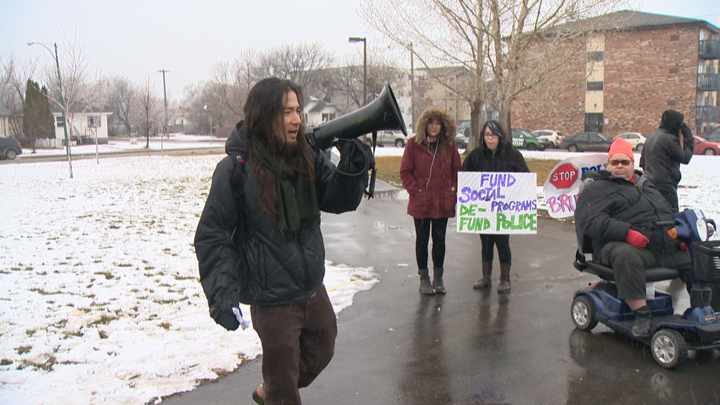SASKATOON – Dozens of protesters were out Tuesday, marking International Police Day Against Police Brutality by rallying against carding. Saskatoon’s Committee Against Police Violence says the practice is discriminatory and unethical.

Eileen Bear is a member of the group. When she was stopped by an officer last year, she says she knew two things: it wasn’t right and it wasn’t random.
“He said ‘You look like someone we’re looking for.’ And I just laughed and said, ‘No I don’t think so,'” she said.
Bear says she was humiliated.
“I said ‘what do you want?’ And he says, ‘Well your name.’ And I said ‘OK … Eileen Bear.’ And then he leaned in toward me and said ‘There now, was that so hard?'” she added.

Get breaking National news
She claims the officer then asked to search her.
“I put both my hands up, took a step back and said ‘I’m sorry. You’re not touching me.'”
What Bear experienced is known as carding. It involves officers stopping people on the street and collecting their information. It has been blasted in provinces in Ontario for targeting ethnic minorities.
READ MORE: Saskatoon police chief wants to engage public on street checks
That’s no surprise to the Saskatoon’s Committee Against Police Brutality. It’s calling for an end to the practice once and for all.
- Toronto Stock Exchange plunges due to massive precious metals sell-off
- Bombardier warns of ‘significant impact’ to travellers from Trump’s threat
- Can Trump decertify aircraft? What experts say amid Bombardier threat
- Stepfather of two missing N.S. kids charged with sexual assault of adult, forcible confinement
Kota Kimuara, a member of the group, says the police service has way too much power, thanks to the Board of Commissioners.
“I believe it’s undemocratic, it’s not accountable to the communities at large. We believe they act as a rubber stamp institution that never really disagrees with what police do,” he said.
Other demands from the local group include community control of the police service, defunding the police force and instead, investing in social programs.
In December 2014, Simon Ash Moccasin issued a complaint against the Regina Police Service for the way he was carded.
READ MORE: Regina man takes police complaint to Human Rights Commission
An inquiry found one of the two officers that stopped Moccasin had gone too far.
Both in Regina and Saskatoon, the police service has pledged to look into the policy and review how it’s done.






Comments